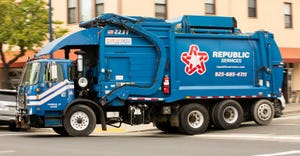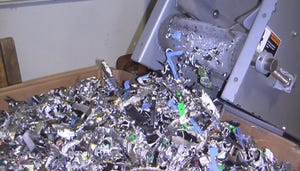RECYCLING: N.Y. Businesses Wising Up ...Haulers Are Too
November 1, 1995
Dana Leisten
As a growing number of cities mandate commercial recycling, private waste haulers will be scrambling to remain competitive in the market. With the help of commercial recycling consultants, some businesses are cutting bottom-line collection costs by as much as 30 to 50 percent, said one N.Y. City consulting firm. "Most of our clients cut their waste bill by as much as 60 percent, and it's even gone as high as 85 percent," said Elana Amsterdam, president of Manhattan-based Ecosav.
Among other cities, N. Y. City now obligates all commercial businesses to keep recyclable materials separate from trash collected by a private hauler or a private recycler. Different businesses are directed to recycle different materials. For example, food and beverage service establishments must recycle corrugated cardboard, metal cans, glass bottles and jars, plastic bottles and aluminum foil. All other businesses must recycle corrugated cardboard, high-grade office paper, magazines, catalogues, phone books, newspaper and textiles. In addition, business/building managers are required to recycle and/or provide labeled recycling containers.
In response to these regulations, businesses are turning with more frequency to area recycling consultants as a means of not only complying with new laws, but to cut costs. "In a number of instances, people were simply not aware of how much garbage they had. They just paid the hauler," said Amsterdam. "Consultants know the markets and know what garbage is worth. We know what businesses should pay."
James Fitzgerald, president of Manhattan-based Envirotron, agrees, "Implementing waste audits is the most important thing a company can do to just get started," he said. "It lets them know how much waste they're generating, whether what they're being charged accurately reflects the results of the audit and then implementing waste minimization programs."
How do these consulting firms accomplish the task at hand? To offset the volatility of the recyclables market, Fitzgerald negotiates contracts that last for a minimum of one year. At the end of the contracted period, Fitzgerald turns to fiber market news sources to determine where the market has gone - up or down - and adjusts the rates accordingly.
Fitzgerald, who deals with more than 50 haulers, arranges competitive bids for his clients based on volume or tonnage, depending on the circumstances. With all of these factors in place, resulting reduction in collection expense can oftentimes be substantial for individual businesses and corporations (see chart).
In order to remain competitive, a large number of haulers may need to re-evaluate and update their modes of operation. Software and scale systems will be key for those haulers who wish to raise their level of sophistication and provide potential customers with realistic carting prices.
Software systems may be used for billing functions such as accounts receivable and payable. They can keep a database of customer addresses, phone numbers, frequency of service, container size, materials collected/disposed, etc. In short, a software system can be used to scrutinize operations, and therefore may assist haulers when bidding for commercial customers.
In addition, on-board scales are crucial in updating operations because haulers may use scales to classify by weight, rather than billing commercial customers by the volume collected. By implementing these systems, haulers will be able to remain one step ahead of the competition (see World Wastes Software and Scales section, June 1995).
"My belief is that every industry goes through an evolutionary process, and while our opportunities become less available, possibly due to haulers becoming more sophisticated, other opportunities present themselves," said Fitzgerald. "For example, I'm starting to get municipal work and research projects that really don't have much to do with saving money, but are more concerned with implementing waste audits to determine how much waste is being produced."
As businesses become more aware of the alternatives for diverting waste, haulers must continue to implement new technologies to remain competitive and provide customers with superior service.
You May Also Like


